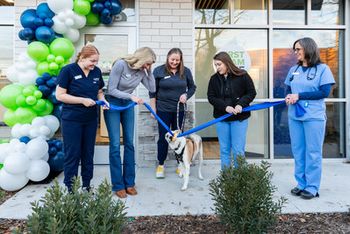
Storing your stuff
Closets, cabinets, cubbies-build in the space you need to keep everything from anesthesia drugs to suture material organized and close at hand.
WELL-THOUGHT-OUT STORAGE CAN LEAD TO A MORE EFFICIENT practice. Haphazard storage, on the other hand, can leave you and your team constantly in search of important items or empty-handed in crucial moments—or even under a pile of fallen cartons when you open an over-full closet.
There's one hard and fast storage rule, really, says Ralph Thibodeau, AIA, an architect in Austin, Texas, and the designer of the 2007 Veterinary Economics Hospital of the Year, Atascocita Animal Hospital in Humble, Texas: "Take advantage of every square inch."
Once you move beyond that basic you-need-all-you-can-get issue, think about where you receive shipments, where you keep supplies until they're used, and point-of-use storage. It's important to think of storage in terms of how supplies flow throughout your hospital, because that goes hand in hand with having the materials you need on hand in the right place at the right time.
Welcome wagon
When items enter your hospital they go to a loading area or a bulk storage room. Ideally, says Veterinary Economics Editorial Advisory Board member Mark Hafen, AIA, NCARB, you limit this function to just one room. That approach, he says, enhances inventory control.
If you think your space is too limited, consider how often you're receiving shipments. You might be able to schedule more frequent deliveries and reduce your storage needs, says Hafen, who's a senior partner with Animal Arts/Gates Hafen Cochrane in Boulder, Colo.
Stage right
Next, you generally move items to a staging area—for instance, the place where you temporarily keep medications after they arrive but before they end up in the pharmacy. This could be as small as a closet, but remember to consider what types of things you'll be staging. Key questions: How secure does this storage need to be? Does it need to include a refrigerator or a dark box to accommodate certain products? And how close does this area need to be to the point of use? For example, you could have a closet directly adjacent to the pharmacy. This allows you to store more drugs in a small space with a lot of shelving, compared to an actual pharmacy where you need writing and work surfaces, too.
Storage solutions: Above and beyond
A closet located directly off of either a chemotherapy room or an intensive care room is another example. You may want to limit access to the room, but it needs to be easily restocked. A simple closet with access directly from the hall and also a door from inside the room addresses this issue.
Straight to the point
Storage at the scene, or point-of-use storage, can be tremendously helpful when you need that certain instrument, prescription, or piece of medical tape. Cabinets in particular offer flexible options so you can choose the sort of storage that works best for you.
For this storage, the most critical issues are accessibility and visibility. For instance, if you need to get things out of the cabinet every 30 seconds, you might not need cabinet doors at all. If you do opt for doors, cabinets with glass fronts let you quickly glance up and see what you have. So no messy labels on the doors, says Thibodeau. Pick solid doors if you don't want clients to see what you're storing or for storing items that are hard to keep neat—although your cabinets are always tidy, right?
Urgent storage needs
In addition to storing your stuff, cabinets can be multi-taskers. If it's in your budget to spend a bit more, consider self-dispensing, limited-access cabinets. You use a code or a card to get the cabinet to dispense what you need—for instance, three bottles of penicillin—and it will automatically track the inventory.
Another trick that Thibodeau says has worked well for him is a backless, pass-through wall cabinet with glass doors on either side, which he and practice owner Dr. Warren Resell included in Atascocita Animal Hospital. This sort of cabinet for storage provides easy access for retrieval or stocking from either side in a treatment area, or in a wall between pack prep and surgery rooms. Beyond that, Thibodeau says you can maximize the efficiency of your storage by getting appropriate shelving. You can get a 12-inch shelving unit that staggers the height of drug containers, for instance, so when you put things on the shelf, you can see items in the second row.
Which way out?
Finally, think about how items leave your practice. For example, knickknacks, leashes, and toys should be as close to client checkout areas as possible. Tracking the volume of food and other products will help you allocate appropriate cabinet and display space adjacent to the reception desk. That way your receptionists won't have to wind their way through the hospital to retrieve items, which will make them more efficient—and happier, too.
But what about things going out the back door, like trash? Hafen recommends small garbage and recycling bins inside the hospital by the back door to stage trash until it goes to the dumpster. "You want an alternative to piling it by the back door," he says. "But you need to think about where you'll put those receptacles and create an appropriate space for it."
Just like everything else.
Elizabeth Trotta is a freelance writer in New York. Please send questions or comments to ve@advanstar.com.
Newsletter
From exam room tips to practice management insights, get trusted veterinary news delivered straight to your inbox—subscribe to dvm360.




